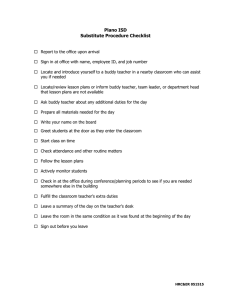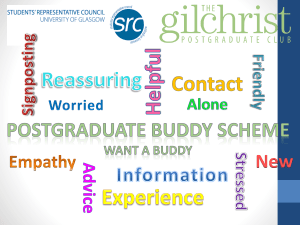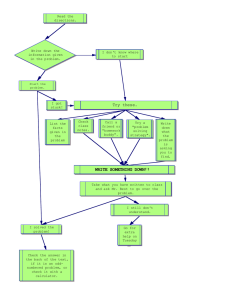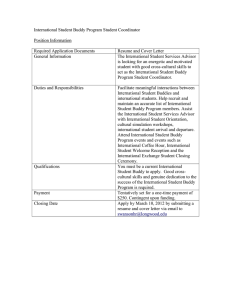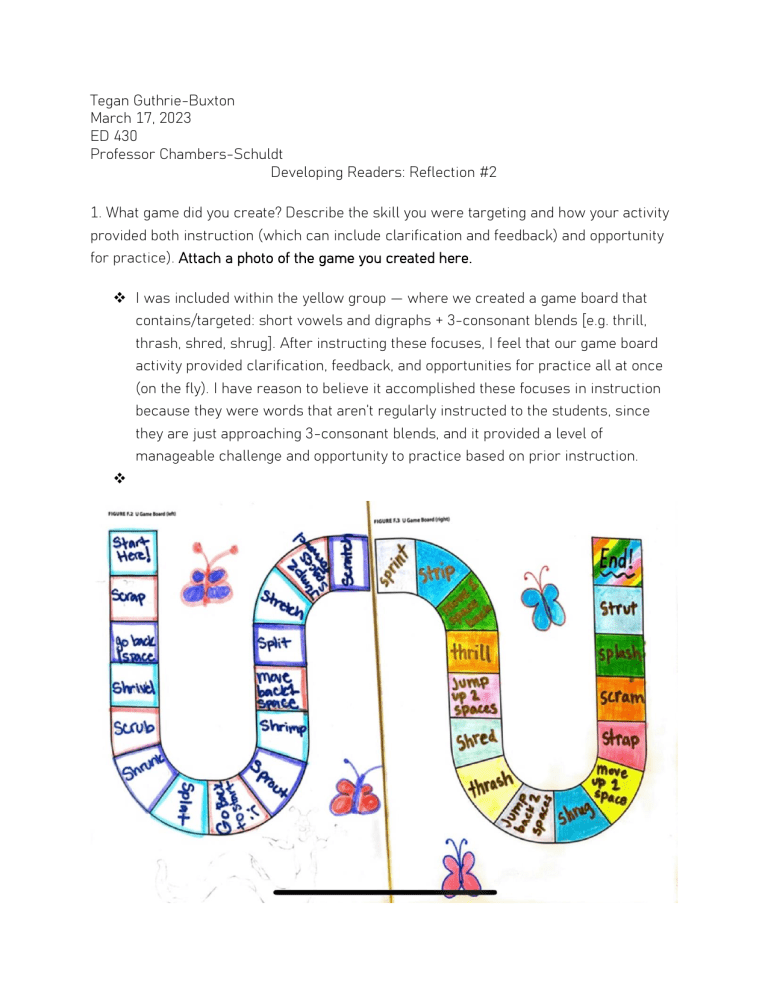
Tegan Guthrie-Buxton
March 17, 2023
ED 430
Professor Chambers-Schuldt
Developing Readers: Reflection #2
1. What game did you create? Describe the skill you were targeting and how your activity
provided both instruction (which can include clarification and feedback) and opportunity
for practice). Attach a photo of the game you created here.
❖ I was included within the yellow group — where we created a game board that
contains/targeted: short vowels and digraphs + 3-consonant blends [e.g. thrill,
thrash, shred, shrug]. After instructing these focuses, I feel that our game board
activity provided clarification, feedback, and opportunities for practice all at once
(on the fly). I have reason to believe it accomplished these focuses in instruction
because they were words that aren’t regularly instructed to the students, since
they are just approaching 3-consonant blends, and it provided a level of
manageable challenge and opportunity to practice based on prior instruction.
❖
2. How did it go? What did you learn about your student(s) through this activity? Make
sure your response addresses both what you learned about your buddy as a person and
student, as well as whether this activity seemed to do what you hoped it would (teach the
skill you were going for) and how easy or challenging it was.
❖ It went wonderfully! The content was attainable, and my student/buddy was flying
through the words, and she was very confident and expressing the words even
when it was not quite her turn or space to do so. This began to impact the two
other students within our game group, so I did indeed have to ask my
student/buddy to practice still but whisper to me so our other buddies in the group
have a chance to practice individually, and have the opportunity to receive any
feedback when necessary. This differentiation did make a light and supportive
space for our buddies. This game did help me understand that my buddy is still
individually motivated to learn, and participate. My student/buddy is aware that she
knows how to sound out words, following words with her finger, and can
comprehend blends through chunking word components; While also recognizing
familiar blends throughout the game to figure out words that are different and
have the same blend sound(s). I think my student/buddy would benefit from more
of these activities plus some challenge, as I have noticed she gets excited to find
challenge in work with us.
3. What would you change about this activity if you were to do it again?
❖ I would totally make this game more accommodating to her and her level of
comprehension. IF I had the opportunity to make the game geared to her, then it’d
benefit her in such an impactful way in which she is not breezing through the
content.
4. As you read with your buddy today (and last week), what did you learn about your
buddy as a reader? Include a detailed description of what you read to them (last week
and/or this week). Were they engaged in talking with you? About what? Did they seem
confident
❖ When reading with my buddy, I notice that they are excellent at following the page
with their finger (keeping their place on the page and following the letter sounds in
challenging words), chunking words to make the word blend more
comprehensible, she is phonetically aware of letter sounds (with support on
challenge words, she often can notice what the word is meant to sound like), they
are also working on “seeing” the magic ‘e’ words, and understanding/knowing that
those words have a long vowel sound (knowing that the vowels say their name).
Unfortunately, both Ms. Stevens and Professor Chambers-Schuldt kept telling me
to refer to this note about magic ‘e’, but I didn’t comprehend their comments until
afterwards… but I keep mentioning to my student/buddy that the letter says its
name — which basically have it away. I learned from that mistake as of now, and I
wish I had been more aware of those very obvious context clues. *Also, I did not
get any chance to read to my buddy, I was not present on the visit of 3/8/23. On the
other hand, on the visit of 3/15/23 my buddy was able to read one of their
challenge books to me, “Barbie in the Nutcracker”. Some of the things I took notice
of included:
o When reading the character names, they skipped over the name “Marzipan”
o I read the word “Colonel” because it’s a very irregular vocabulary word for a
1st grader
o They read the word “eve” as “have” — which I assume is the choice of
reading quickly and they recognized the ‘-ve’ in the word
o The word “received” was challenging — because they are working on magic
‘e’ words
o I also assume this word rule may not have been instructed yet, so my
student/buddy read “special” aloud as “speckle”
o She chunked up words like ‘wonderful” {w-on-d-er-ful} and “he’s” {he is —
she knew what an apostrophe was without naming it as an apostrophe; and
was able to explain how she knew how “he’s” is actually a compound word
he+is… although she avoided actually saying “he’s” until Professor
Chambers-Schuldt supported me and my student/buddy in saying this
challenging compound word)
5. What did you learn from listening to your buddy read? Be sure to specify what kinds of
reading behaviors you saw in their reading AND what you did when you prompted them.
(Note- reading behaviors include things like self-correcting (or not), reading fluently and
stopping at punctuation (or not), engaging with the content and making connections,
asking questions, looking at the pictures...)Attach a picture of your formative assessment
notes from this week with the date on them.
❖ Like I mentioned above, my student/buddy was able to chunk, sound out by letters,
blends were recognizable due to prior instruction, they were efficiently selfcorrecting when feedback was necessary and provided, and since it was a
challenging book they were not fluently reading and were reading word by word.
They were aware of the context only because prior to this book they had watched
the animated movie.
❖
6. Was this similar to what you observed last week? Different? In what way? (This
requires that you explain what you observed last week and the notes you took/ prompting
you did ). Attach a picture of your formative assessment notes from last week with the
date on them.
❖ I was not present but this is the photo that Madyson provided me. I was not
provided a photo of the notes..but I would like to get a photo the next visit we make
AFTER Spring Break. I apologize for this inconvenience.
❖
7. What growth are you seeing in your student?
❖ Self-correction! They are not looking to me for validation or answers immediately
— like when we had our very first visit. They were able to use context clues of
words to problem solve independently. I also notice more and more drive to help
with my homework with my 2nd visit to the classroom, and they express
themselves more confidently with the assessments.
8. What do you need help with in terms of your work with this student? Something
puzzling?
❖ Maybe knowing questions to support an expanded thought process, and how to
prompt these questions without providing answers. This is just a skill I am trying
to initiate more and more with classroom visits, in general.

